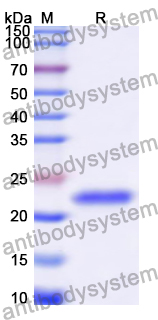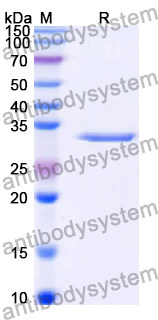Catalog No.
YHA23401
Expression system
E. coli
Species
Homo sapiens (Human)
Protein length
Thr95-Pro271
Predicted molecular weight
22.50 kDa
Nature
Recombinant
Endotoxin level
Please contact with the lab for this information.
Purity
>90% as determined by SDS-PAGE.
Accession
O14595
Applications
ELISA, Immunogen, SDS-PAGE, WB, Bioactivity testing in progress
Form
Lyophilized
Storage buffer
Lyophilized from a solution in PBS pH 7.4, 0.02% NLS, 1mM EDTA, 4% Trehalose, 1% Mannitol.
Reconstitution
Reconstitute in sterile water for a stock solution. A copy of datasheet will be provided with the products, please refer to it for details.
Shipping
In general, proteins are provided as lyophilized powder/frozen liquid. They are shipped out with dry ice/blue ice unless customers require otherwise.
Stability and Storage
Use a manual defrost freezer and avoid repeated freeze thaw cycles. Store at 2 to 8°C for frequent use. Store at -20 to -80°C for twelve months from the date of receipt.
Alternative Names
Carboxy-terminal domain RNA polymerase II polypeptide A small phosphatase 2, 3.1.3.16, Nuclear LIM interactor-interacting factor 2, NLI-interacting factor 2, Protein OS-4, Small C-terminal domain phosphatase 2, Small CTD phosphatase 2, SCP2, CTDSP2, NIF2, OS4, SCP2
ctdsp2 Knockout Induces Zebrafish Craniofacial Dysplasia via p53 Signaling Activation., PMID:39941065
Whole-exome sequencing reveals genetic variants that may play a role in neurocytomas., PMID:38319496
Indoor particulate matter induces epigenetic changes in companion atopic dogs., PMID:37827097
Non-allergic eye rubbing is a major behavioral risk factor for keratoconus., PMID:37053215
[SCP Phosphatases and Oncogenesis]., PMID:34432772
Whole-exome sequencing analysis to identify novel potential pathogenetic mutations in fetuses with abnormal brain structure., PMID:34268420
The miR-26 family regulates neural differentiation-associated microRNAs and mRNAs by directly targeting REST., PMID:34151974
Lipoblastomas presenting in older children and adults: analysis of 22 cases with identification of novel PLAG1 fusion partners., PMID:33097826
Integrated exome and RNA sequencing of dedifferentiated liposarcoma., PMID:31831742
Tumor suppressor properties of the small C-terminal domain phosphatases in non-small cell lung cancer., PMID:31774910
Genome landscapes of rectal cancer before and after preoperative chemoradiotherapy., PMID:31660073
Genetically defined elevated homocysteine levels do not result in widespread changes of DNA methylation in leukocytes., PMID:29084233
A double-negative feedback loop between EZH2 and miR-26a regulates tumor cell growth in hepatocellular carcinoma., PMID:26781064
MicroRNA-26a inhibits TGF-β-induced extracellular matrix protein expression in podocytes by targeting CTGF and is downregulated in diabetic nephropathy., PMID:26063197
FOXO target gene CTDSP2 regulates cell cycle progression through Ras and p21(Cip1/Waf1)., PMID:25990325
Candidate genes in ocular dominance plasticity., PMID:22347157
Intronic miR-26b controls neuronal differentiation by repressing its host transcript, ctdsp2., PMID:22215807
The enemy within: intronic miR-26b represses its host gene, ctdsp2, to regulate neurogenesis., PMID:22215805
MicroRNA-26a/b and their host genes cooperate to inhibit the G1/S transition by activating the pRb protein., PMID:22210897
The disordered C-terminus of the RNA polymerase II phosphatase FCP1 is partially helical in the unbound state., PMID:21672523
Design and evaluation of a panel of single-nucleotide polymorphisms in microRNA genomic regions for association studies in human disease., PMID:19809479
Dephosphorylation of the linker regions of Smad1 and Smad2/3 by small C-terminal domain phosphatases has distinct outcomes for bone morphogenetic protein and transforming growth factor-beta pathways., PMID:17085434
Small carboxyl-terminal domain phosphatase 2 attenuates androgen-dependent transcription., PMID:16724108
Expression cloning of Xenopus Os4, an evolutionarily conserved gene, which induces mesoderm and dorsal axis., PMID:11784023
Characterization of a highly conserved gene (OS4) amplified with CDK4 in human sarcomas., PMID:9315096


